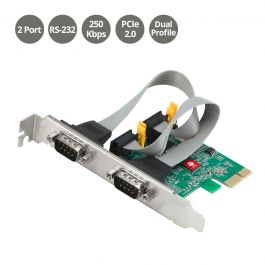Hello,
I have a motherboard without serial ports and I wonder whether it is possible to get a serial console (server side) on it with a PCIe RS232 card or a USB-to-RS232 adapter. So far I had no luck. I can get a console that works once the system finished booting (once getty process start as per /etc/ttys). But what I really need is a console to interact with loader, get kernel messages and interact in single user mode. I don't think this is supported with USB device (happy to be corrected here) but I was hoping that PCIe card will work.
I have in my /boot/loader.conf
The card I have:
Can be seen during boot as
I tried adding
to /boot/device.hints but flags still does not appear in the boot entries above. With boot_serial="YES"/console="comconsole" in the loader.conf console disappears from HDMI output until the boot finishes, but still does not appear on the serial port.
Has anyone ever managed to get something like this to work? I will appreciate any suggestions!
I have a motherboard without serial ports and I wonder whether it is possible to get a serial console (server side) on it with a PCIe RS232 card or a USB-to-RS232 adapter. So far I had no luck. I can get a console that works once the system finished booting (once getty process start as per /etc/ttys). But what I really need is a console to interact with loader, get kernel messages and interact in single user mode. I don't think this is supported with USB device (happy to be corrected here) but I was hoping that PCIe card will work.
I have in my /boot/loader.conf
Code:
boot_serial="YES"
console="comconsole"The card I have:
Code:
uart0@pci0:1:0:0: class=0x070002 rev=0x00 hdr=0x00 vendor=0x125b device=0x9100 subvendor=0xa000 subdevice=0x1000
vendor = 'Asix Electronics Corporation'
device = 'AX99100 PCIe to Multi I/O Controller'
class = simple comms
subclass = UART
uart1@pci0:1:0:1: class=0x070002 rev=0x00 hdr=0x00 vendor=0x125b device=0x9100 subvendor=0xa000 subdevice=0x1000
vendor = 'Asix Electronics Corporation'
device = 'AX99100 PCIe to Multi I/O Controller'
class = simple comms
subclass = UARTCan be seen during boot as
Code:
uart0: <ASIX AX99100 PCIe 1/2/3/4-port RS-232/422/485> port 0x3010-0x3017 mem 0x70b03000-0x70b03fff,0x70b02000-0x70b02fff at device 0.0 on pci1
uart1: <ASIX AX99100 PCIe 1/2/3/4-port RS-232/422/485> port 0x3000-0x3007 mem 0x70b01000-0x70b01fff,0x70b00000-0x70b00fff at device 0.1 on pci1I tried adding
Code:
hint.uart.0.at="pci0:1:0:0"
hint.uart.0.flags="0x10"Has anyone ever managed to get something like this to work? I will appreciate any suggestions!


